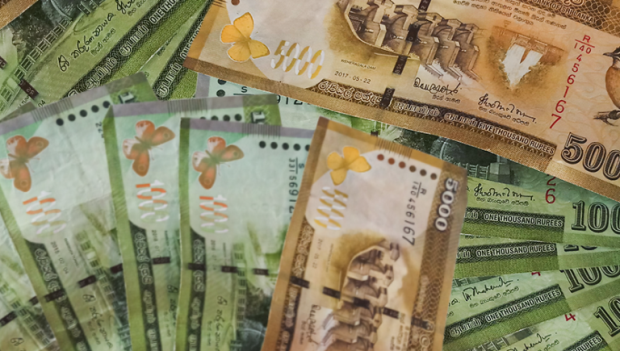COLOMBO – Sri Lanka’s rupee bond yields were quoted wide on Tuesday (29) dealers said, after Moody’s downgraded the government rating to Caa1 (CCC+) while sovereign bond rates, which turned after constitutional amendment was gazetted on September 3, continued to rise.
Spreads of most tenors which was around 5 basis points widened to over 40 basis points reflecting uncertainty, while yields were also higher. The rupee was quoted weaker at 185.80/186.10 to the US dollar, down from 185.25/40 levels on Monday (28).
A 2-year bond maturing on 15.12.2022 was quoted at 5.70/6.10 up from 5.63/70% on Monday, while a bond maturing on 15.01.2023 was quoted at 5.80/6.25% up from 5.65/75% and a bond maturing on 15.09.2024 was quoted at 6.20/30% up from 6.12/18%.
A bond maturing on 01.05.2025 was quoted at 6.60/7.10% up from 6.55/60% and a bond maturing on 01.02.2026 was quoted at 6.80/7.25 up from 6.65/75%, while a bond maturing on 15.08.2027 was quoted at 7.10/7.60% up from 7.00/10%.
A bond maturing on 01.07.2028 was quoted at 7.25/7.75 up from 7.10/25% and a 10-year bond maturing on 15.05.2030 was quoted at 7.40/8.00% up from 7.38/48%.
Sri Lanka’s sovereign bond yields which started to fall after the rupee stabilized from a steep fall in March and April and a credit downgrade from Fitch and Standard and Poor’s also turned direction from September 4 after a constitutional change was gazetted.
Moody’s downgraded Sri Lanka’s credit by two notches to Caa1 (CCC+ equivalent), citing weak institutions and budgets on Monday
“Governance considerations are an important driver of today’s decision to downgrade the rating,” the rating agency said.
“Moody’s assessment of Sri Lanka’s institutions and governance strength primarily relate to the slow pace of reform implementation, as well as political risks, which impair the effectiveness of fiscal and economic policymaking.
“Moreover, Sri Lanka’s fragile and deteriorating fiscal position will continue to impede fiscal policy effectiveness over the medium term.”
Sri Lanka’s Finance Ministry said the downgrade was unwarranted as the domestic economy was recovering with exports and remittances also improving.
“This downgrade and the report fail to do justice to the ground reality of the ongoing rapid economic recovery backed by vastly improved business confidence arising from the return of political and policy stability after a lapse of five years,” the finance ministry said.
Sri Lanka is one of few countries that have controlled the spread of coronavirus within the country and the domestic economy is operating almost at normal levels. However, the government has controlled imports and is trying to run an ‘import substitution’ economy after printing money.
-economynext.com


